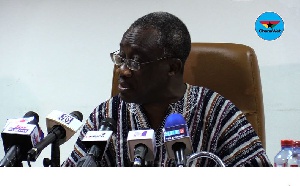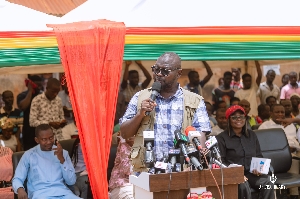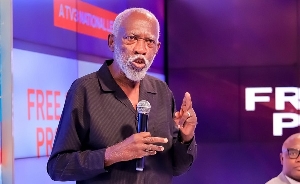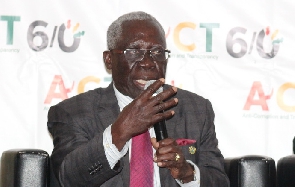Emmanuel Kofi Nti, Commissioner-General of Ghana Revenue Authority (GRA) has disclosed that the GH?700.00 allowance of Nation Builders’ Corps (NABCO) personnel is not taxable.
According to him, NABCO policy is deliberately designed to get the teeming unemployed youth onto the job market.
The Commissioner-General explained that the Authority was excluding the personnel from the deduction of what belongs to ‘Caesar’, due to the circumstance in which the NABCO personnel found themselves, despite the GH?700.00 being above the minimum wage and taxable by law.
Describing himself as a policy implementer, he further added that NABCO is a concept to provide jobs, build capacities of personnel in the world of work and then move forward.
Supervising at least 5000 NABCO personnel under the GRA, he said: “NABCO personnel are on allowance and not on income. See the challenging times of their lives and we want them to have greater exposure and build their capacities in the world of work and move forward with it.”
Mr Nti was speaking at media soiree held on Friday, January 31, 2019 in Accra.
He stated that through the NABCO initiative, the Authority has tended to reach every potential taxpayer at least for 2019.
2018 tax target not met
The Authority, ahead of 2018, targeted to collect an amount of GH?39, 802. 27 billion as tax revenue, however, it was able to gather GH?37, 630.54 billion ((94.5%) with a shortfall of GH?2171. 73 (-5.5%).
Despite not being able to achieve the target, the 2018 performance was a nominal growth rate of 16. 4% over the 2017 collection.
With the avowed aim of reversing the trend, GRA has adopted about 12 strategies to reach its revenue target in 2019 and among these strategies are identifying and blocking revenue leakages, full implementation of Excise Tax Stamp, broadening the tax net, among others.
Shun products without tax stamps
For health and safety reasons, the Commissioner-General urged the public to shun products without tax stamps, explaining that the probability of products that had the stamps have certification from Ghana Standard Authority and Food and Drug Authority were high.
According to him, the tax stamp should be of interest to citizens of this country, therefore, they must make it a policy not to buy any product without a tax stamp, saying: “We want the whole society to be involved with that clarion call – No tax stamp no purchase.”
TIN
At the last quarter of December 2017, the number of people registered on the Tax Identification Number (TIN) was 1.17384 million. The number, however, moved to 2 million within the same period last year. To the GRA boss, that was good news.
Freight Forwarders
The Ghana Revenue Authority, he continued, will cut down the number of freight forwarders whilst the criteria for their selection would also be tightened as well.
The system would be cleaned to enforce the rules that would allow for greater compliance of their activities.
Paying tax is divine
Mr Kofi Nti also reiterated the need and importance for religious bodies and their members to pay tax, stressing that honouring tax obligation is a civic responsibility, especially to those who worship God.
He argued that churches have diverted from their charity roles of building schools and hospitals, which were the government duties, and had moved into conducting business, hence, must endeavour to pay their taxes.
He noted that the early church was transparent and accountable for how funds were disbursed for each project, but things have changed in recent years.
The GRA Boss pointed out that Jesus Christ commanded Christians to take care of the poor and needy in society, therefore, they must pay their taxes to enable the state provide social amenities to improve the lives of the people.
Similarly, he added that the Quran speaks of the need to pay tax to care for the needy in society, for that reason it is important that all eligible taxpayers respect the law in order to bridge the poverty gap and improve upon livelihoods.













